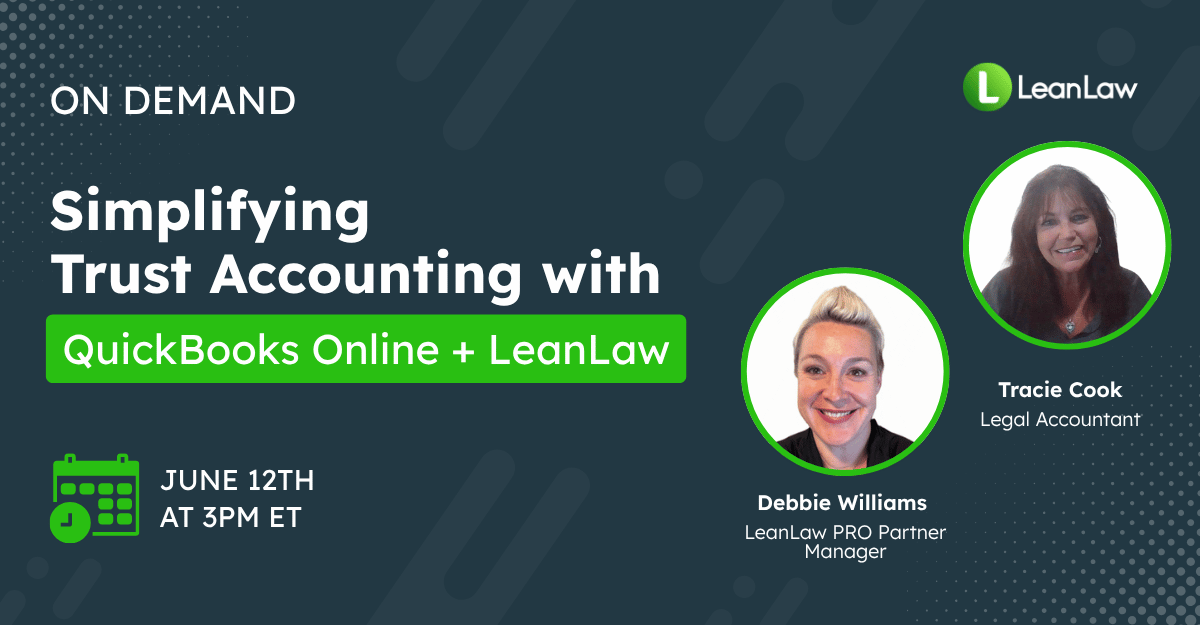
Trust accounting can be one of the most complex and compliance-sensitive aspects of managing a law firm’s finances. Fortunately, technology now offers intuitive, reliable solutions to help firms stay compliant, organized, and efficient. In a recent session hosted by LeanLaw, Partner Program Manager Debbie and seasoned accountant Tracy Cook shared insights on how law firms can streamline their trust accounting processes using QuickBooks Online integrated with LeanLaw—with a special focus on electronic payments through Confido.
Why Trust Accounting Matters
Tracy Cook, with over 30 years of experience in legal accounting, opened the discussion with a foundational overview of trust accounting. At its core, trust accounting ensures that client funds are kept separate from firm funds, often in IOLTA accounts (Interest on Lawyers’ Trust Accounts). These accounts are strictly regulated, and mishandling them—even unintentionally—can have serious ethical and legal consequences.
Tracy broke down how firms use retainers and how withdrawals must directly align with billable work. This process demands impeccable record-keeping and compliance, which can be daunting for busy attorneys and support staff.
Avoiding Compliance Pitfalls
Common trust accounting challenges include commingling funds, manual errors, and failing to maintain audit-ready records. Tracy highlighted how modern software solutions like LeanLaw minimize these risks. Features such as Three-Way Trust Reconciliation and automated journal entries help ensure that trust transactions are accurately tracked and properly reported.
Notably, Tracy mentioned that California has added new monthly reporting requirements for trust accounting, making automation more critical than ever for firms in that state.
LeanLaw: Built for Legal Professionals
While trust accounting principles can apply to various industries (like architecture firms or HOAs), LeanLaw is purpose-built for law firms. Tracy shared that the platform’s real-time QuickBooks integration streamlines billing, trust deposits, and invoice management. A standout feature is the two-way sync that allows data to flow seamlessly between LeanLaw and QuickBooks, reducing redundant data entry and saving time.
Tracy also showcased Lien Law, a tool tailored for billing and invoicing that mirrors LeanLaw’s trust features but is optimized for firms dealing with liens. Both platforms support matter-specific financial tracking and enable firms to generate detailed reports at the click of a button.
Confido: Streamlining Client Payments
An exciting addition to the tech stack is Confido, which allows firms to manage electronic trust fund payments directly through LeanLaw and QuickBooks. Tracy demonstrated how payments—whether via ACH, debit, or credit card—are processed, tracked, and synced automatically. With processing fees as low as 1% for ACH and a cap of $30, Confido is a competitive, compliant solution for modern firms.
Getting Started with the Pro Partner Program
Debbie concluded the session by highlighting the LeanLaw Pro Program, which offers exclusive discounts for clients and added benefits for partners. This includes access to personalized onboarding, support, and resources to help firms and accountants take full advantage of LeanLaw’s powerful capabilities.
Final Thoughts
Trust accounting doesn’t have to be a pain point. With integrated tools like LeanLaw, Lien Law, QuickBooks Online, and Confido, law firms can manage their trust accounts with confidence and ease—while staying compliant with evolving regulations.



